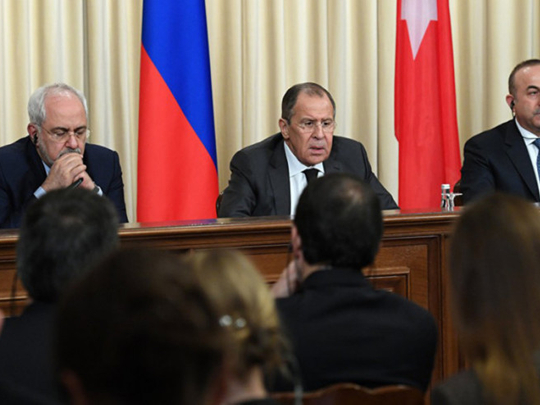
Beirut: A series of marathon conferences on gathering Syrian conflict players is taking place this week and next with the aim of wrapping up the Syrian conflict now running almost seven years.
A gathering of the Syrian opposition will take place tomorrow in Riyadh ahead of the UN-sponsored talks in Geneva on November 28. However, what could end up having the most direct impact is a third conference in Sochi — the brainchild of Russian President Vladimir Putin — scheduled for December 2.
The conference hopes to assemble 1,400 delegates from the regime, opposition, and civil society.
It was originally scheduled for November 18 but was called off at the last moment, due to concerns from heavyweight groups in the opposition, namely the Syrian National Coalition and the High Negotiations Committee.
Mohammad Alloush of the Islamic Party, at the time described the talks as “negotiations between the regime and the regime.”
Nonetheless, Putin has every intention of going through with the conference, regardless of who shows up from the opposition.
The UN will be represented as well, lending greater legitimacy to the conference.
Political process
Now rid of Daesh, Putin is reportedly eager to jumpstart a political process and declare “mission accomplished” in Syria ahead of the Russian New Year in January.
He wants to pull his troops back home ahead of the next Russian presidential elections in March.
To do that, Putin has agreed to support the US army’s presence in post-Daesh Syria, after they announced readiness to stay in the country until after the peace process kicks off and bears fruit.
During a recent meeting in Vietnam, Putin and US President Donald Trump agreed to work closer together on the four “de-escalation zones” and avoid clashes.
In return, the US will not stand in Russia’s way while it pushes ahead with the conference which aims to draw the war to a close.
Iran will attend Sochi as an observer, with no decision-making authority or veto power — a stark change from the Astana talks held in May 2017 where it was given the status of guarantor.
This is Russia’s way of appeasing the US, Israel and Gulf states who are weary of Iran’s expanding influence in the region.
However, the sidelining of Iran could just be for cosmetic purposes. “Whether Iran is represented by their own delegation or via the Syrian regime—its one in the same,”It has no meaning,” said Fayez Sara, a senior member of Syria’s opposition.
Putin and Trump have publicly agreed that there is no military solution in Syria, only a political one, which contradicts everything being said by senior Iranian clerics and generals since 2011.
Turkey is also uneasy with Sochi, especially that it involves a wide assortment of Kurdish militias and political parties, which Ankara categorises as ‘terrorist’.
In exchange for attending and encouraging its Syrian allies to attend, Ankara has asked Russia to freeze all invitations sent out to Kurdish politicians. It remains to be seen whether or not Russia will rescind their invitations.
Murhaf Jouejati, a professor of international relations at the Abu Dhabi-based Emirates Diplomatic Academy, believes such conferences are futile, “as long there is refusal to talk about a political transition away from the Al Assad regime”.











